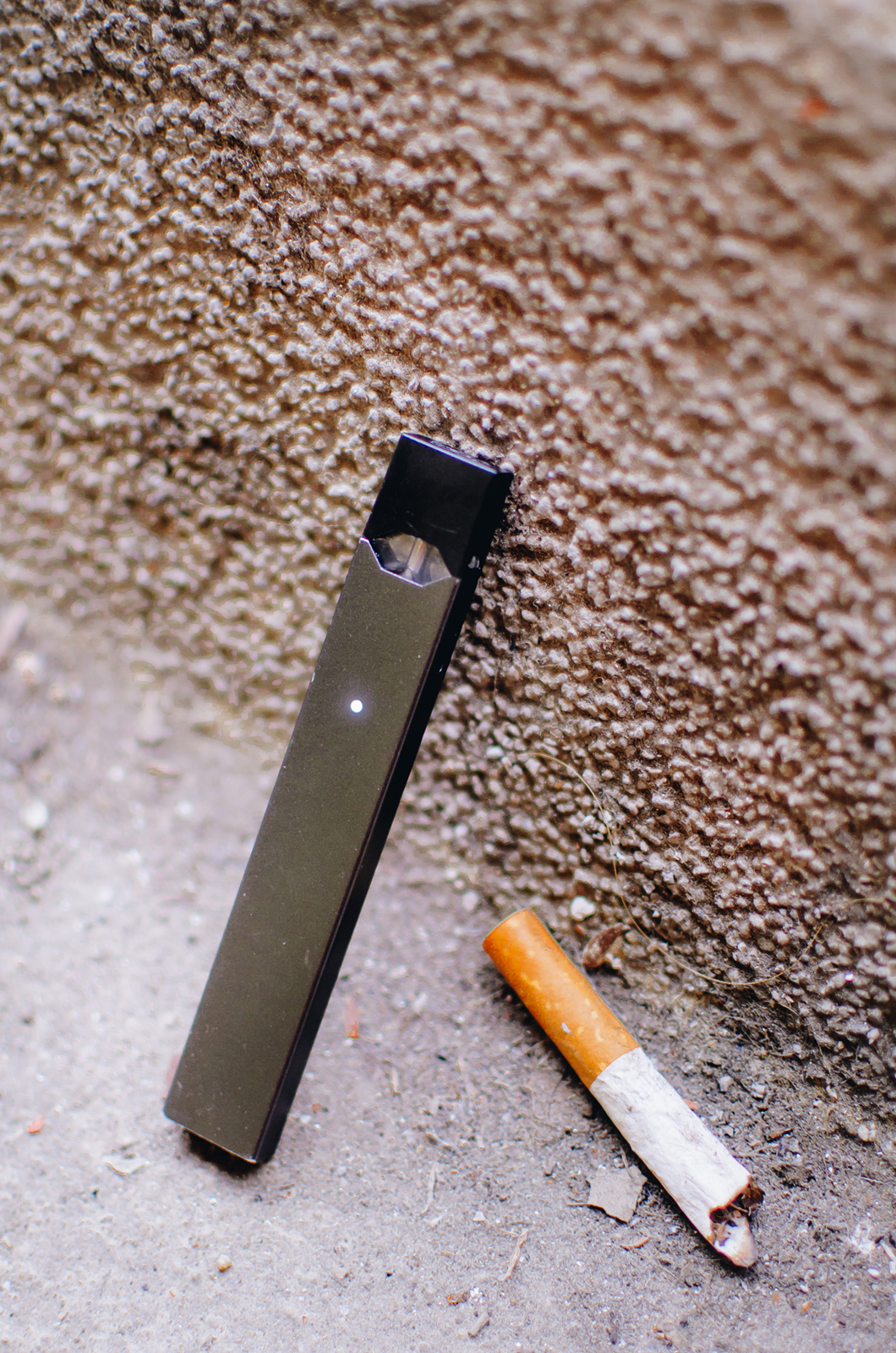Students don’t know enough about e-cigarettes. UCLA should fix that.

Smoking isn’t cool – and UCLA should take the appropriate steps to make sure its students know that. That means adding trainings through its online modules and educating students on nicotine’s harmful effects. (Kanishka Mehra/Daily Bruin)
By Leslie Landis
Jan. 31, 2019 11:35 p.m.
We’ve all been traumatized from a young age by the disturbing anti-smoking commercials showing images of diseased lungs and former smokers using a voice box. By the time we were old enough to buy cigarettes, we understood they were bad for us.
But this was the early 2000s, and e-cigarettes hadn’t become popular.
Fast forward to 2019: Cigarettes are out, and vaping is in. Vaping on college campuses has become a social phenomenon, with students vaping anywhere: in their dorms, in frat parties and even in class. Companies such as Juul Labs have appealed to younger demographics, creating popular vape flavors, like mango and creme, and devices that can look like sleek USB drives to parents and teachers. According to the National Center for Health Research, Juuls have more than twice the concentration of nicotine than similar e-cigarettes, increasing the risk of addiction.
Despite vaping’s popularity, UCLA does not address its risks to students. The UCLA Arthur Ashe Student Health and Wellness Center provides a limited supply of nicotine replacement patches and gum to students interested in quitting smoking. That and providing various links on quitting smoking is the extent of UCLA’s efforts. And none of these resources specifically target e-cigarettes.
It’s clear e-cigarettes pose harm to students. UCLA should provide up-to-date information to Bruins on the effects of e-cigarettes through online programs and facilitated conversations with health professionals. The popularity of e-cigarettes is not a fad. It’s time for UCLA to step up its game and take a more active role in its students’ mental and physical health.
UCLA spokesperson Katherine Alvarado said the university officially became smoke- and tobacco-free in 2013.
The policy, implemented on Earth Day, was mainly for environmental reasons and lacks an educational stance. There are no specifics on why e-cigarettes are banned, what makes them dangerous to students and no further discussion on the topic. The policy simply outlines a timeline of the progression of tobacco-related diseases, a fact already drilled in our minds from childhood.
Not surprisingly, students have not obeyed the rules and have continued to use e-cigarettes on campus. While e-cigarettes may seem like a good alternative, in addition to nicotine, they contain other harmful ingredients, including ultra-fine particles that can get inhaled deep into the lungs, heavy metals like lead and tin, and diacetyl, a chemical linked to lung disease.
E-cigarettes can also lead to health risks, such as nicotine addiction, mood disorders and permanent drops in impulse control. Nicotine can harm the parts of the brain that control attention and learning. In fact, the National Institute on Drug Abuse found evidence to suggest that e-cigarettes serve as a gateway to other tobacco products.
Nick Eischens, a fourth-year economics student who recently quit vaping, said e-cigarettes aren’t perceived the same way cigarettes are.
“People don’t see it as a substance. It’s more of an accessory,” he said. “People do smoke tricks with it and people think it’s sick. But it’s obviously a substance and it is addictive.”
Moreover, a significant number of labels on e-cigarette liquid nicotine containers are inaccurate.
While college students maintain freedom to decide for themselves, it’s the job of the university to educate them about the health concerns. College students aren’t aware of all the things they need to know about e-cigarettes and should be adequately informed. After all, according to an annual national survey of 40,000 to 50,000 students from the University of Michigan’s 2016 Monitoring the Future study, the majority of youth e-cigarette users think they vaped only flavoring, not nicotine.
Sabina Selzer, a first-year geography/environmental studies student, said while e-cigarettes may not be as bad for your body, their effects are still dangerous.
“They’re both highly addictive products if you’re inhaling something,” she said. “It doesn’t matter if e-cigarettes are a little bit better for you, they’re just as bad mentally.”
UCLA already requires entering students to complete online modules on alcohol consumption and should implement a course on e-cigarette usage as well. New Student Orientation could also facilitate conversations between students and health professionals about nicotine so Bruins can enter campus in the fall equipped to make the best decisions.
Some might argue this isn’t the university’s concern and that UCLA already educates students on harmful substances. However, UCLA has taken an active role in educating students about other pressing topics on campus, such as the issues of sexual assault, alcohol use in fraternity parties and substance abuse. Many students aren’t informed on what e-cigarettes are or the harm they can cause because they’re just not given the information. Students are likely to fall for peer pressure and intriguing advertising from vaping companies, and UCLA can deter that.
“Like with smoking, people all thought when it first came out that it was OK. Then they were later finding out it was linked to lung cancer. Since vaping is newer, there is more to be found out,” said Darci VanRyckeghen, a third-year psychology student.
E-cigarettes are the new craze. UCLA shouldn’t let the smoke cloud the obvious.


